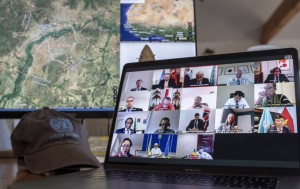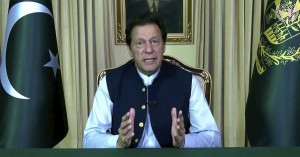Virtual Diplomacy
The coronavirus pandemic has affected the world massively and its impact is already being felt at the local, regional and international levels in multifarious ways. International diplomacy is one area that is at the centre of the whole phenomenon, and we have seen this phenomenon at this year’s annual session of the United Nations General Assembly. Traditionally, the spectacles at the UNGA unfold in grand and scripted fashion: Leader after leaders striding to the podium inside the colossal UNGA chamber to uncork carefully calibrated speeches, posture publicly and speak the language of statecraft. And each year, in the hallways of the United Nations and the hotels that surround it, intensive doses of more intimate, more genuine diplomacy take place in quiet conversations, in small bilateral meetings, in one-on-one huddles that gestate subtle understanding and, sometimes, even prevent wars.
However, this year, because of the coronavirus pandemic, the spectacles still happened, but remotely this time—on video, in pre-recorded fashion, far from the madding diplomatic crowd. This year, the UN’s halls were mostly empty. On the chamber’s floor, delegations were limited to one person for each member state. The giant screens were full of far-off leaders who took no planes to convene but, instead, recorded messages in the safety and isolation of their home countries and their offices. This sea change suggests that diplomatic practices will change significantly in the post-pandemic world where online meetings, discussions and deliberations will become a norm.
Diplomacy is a complex process, and its success depends on interpersonal relationships that are forged during numerous formal and informal gatherings, including conferences, lunches and receptions. During difficult negotiations, the most sensitive sticking points are often ironed out informally, in corridors or lounges. However, the advent of the information age has changed the way diplomacy was conducted in the past. The ongoing pandemic has exposed us to “virtual diplomacy” as the new technique of diplomacy that signifies the altered diplomacy associated with the emergence of a networked globe.
While diplomacy is today constrained by the requirement of physical distance, virtual diplomacy has enabled seamless communication and information flow (the two fundamental aspects of diplomacy) between countries. While one might point out the merits of face-to-face meetings that provide better negotiating and bargaining opportunities, but again virtual diplomacy saves time and hassles of organizing high-level delegation visits. However, the compelling circumstances might help leaders to adapt to the virtual model over time and information technology-backed communication methods might emerge more effectively in post-pandemic deliberations.
As the pandemic continues to intensify the social, economic, and environmental crises, we will probably bear witness to reductions in financial and human resource allocations for diplomatic hubs, coupled with increased demands. It will then be natural to streamline our resources as we navigate through these uncharted and unpredictable waters.
On the upside, virtual meetings will allow for reduced travel budgets, especially as travel restrictions remain in place in many parts of the world, and as hybrid settings will permit the continuation of multilateral discussions and dialogues. Notwithstanding, there may also be a need for improved access to technological tools and working methods. Diplomats may benefit from broadening their skill set, among others, through improved digital capabilities and experience in virtual negotiation rooms. In the end, multilateralism and diplomacy will continue to play a key role in tackling the pandemic, while the promotion of increased trust and co-operation will be fundamental pillars of the global response to our shared challenges.
Challenges
The accelerated transition towards online meetings and diplomacy faces four major challenges.
The first relates to the technology itself. There have been innumerable breakthroughs in communications technology, yet it still often fails us. Despite all the latest technological developments, online platforms are not yet stable nor intuitive enough for seamless meetings. The online experience is usually characterised by repetitive exchanges of ‘Can you hear me?’ or reminders to (un)mute the microphone. These problems may seem trivial, but they can hamper the momentum of a meeting. This has discouraged both individuals and organisations from relying on online conferencing. There is a clear need for smarter platforms that account for human imperfections and create better user experiences. Even to this date, basic access to the Internet remains a serious challenge in many developing countries, which are already marginalised in traditional diplomacy. Reliable access must be ensured in these places in order to avoid digital and diplomatic divides reinforcing each other.
- Physical interactions
The fundamental dynamics of human interaction and attention are the second area of concern. Online meetings bring forth new social dynamics compared to traditional meetings. The rich, human context that shapes a face-to-face meeting is often absent in a virtual setting. Body language and overall ‘personal chemistry’ are minimised or lost entirely. Establishing a presence in meetings, or simply keeping the attention of participants, can be incredibly difficult. When more interesting and engaging content is readily accessible, running an effective meeting is almost impossible. As diplomacy and other fields steer towards the online space, it is clear that we need engaging meeting platforms and techniques beyond the existing ‘talking heads’ format. 
- Protocols and codes of conduct
Finally we have an issue of particular importance in diplomacy: protocol. Online meetings challenge centuries-old rules of protocol shaped by hierarchy and fixed rituals. Online exchanges have proven to be more informal and less ‘protocol friendly’. While the loss of some aspects of diplomatic tradition would not be regretted, some rules of engagement must remain. Protocol and rituals protect diplomats’ unique role as representatives of their countries, and are essential in allowing them to engage with their counterparts despite divergent and conflicting national positions and interests.
- Leaders’ chemistry
It would appear that while digital tools may be useful for diplomacy, especially during the time of crisis, the success of this variant is conditional on several fronts. One, a lot may depend on the personalities of the heads of state or government that are involved. Since these are primarily one-on-one telephonic conversations with time constraints, judging the body language and gauging the trajectory of negotiation is problematic.
Way forward
While these challenges will continue to make the art of diplomacy difficult, there is no turning back. We need to adjust and adopt the best of both worlds: a new, ‘hybrid diplomacy’ that combines face-to-face and online meetings. Highly delicate political negotiations such as the recent peace deal between the USA and the Taliban demonstrate the continued necessity of gathering real people in actual rooms. But many other more technical and routine meetings can and should shift online.
So, for the foreseeable future, though, as nations around the globe struggle with the unprecedented challenge of the coronavirus pandemic and worldwide travel restrictions continue, it may be necessary for high-level diplomacy to be conducted largely through virtual means. The ready availability of modern means of digital telecommunications will facilitate these interactions. Finance Ministries around the world will find the resultant cost-cutting welcome in the midst of the severe economic downturn brought about by shutdowns and closures necessitated by the pandemic. It remains to be seen how much of this will eventually also become the longer-term norm, changing the way diplomatic conversations are conducted and perhaps even streamlining diplomatic representations around the world.
Conclusion
Hopefully, coronavirus will pass soon. However, in its wake, we must nurture the new ideas and approaches we gain from this crisis, while effectively fusing them with our traditional practices. The way that diplomacy – and our online meeting spaces – adapts will be critical in addressing other crucial issues for humanity, from fighting climate change to ensuring peace and dealing with other global issues for years to come.
The writer is a member of staff.
 Jahangir's World Times First Comprehensive Magazine for students/teachers of competitive exams and general readers as well.
Jahangir's World Times First Comprehensive Magazine for students/teachers of competitive exams and general readers as well.





